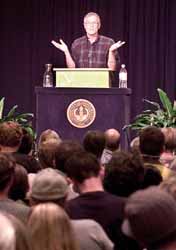Environment and social problems linked
About 600 Utah State University students and Cache Valley residents listened to Paul Hawken speak about the environment in the Taggart Student Center Ballroom Thursday.
Hawken, an international and national best-selling author, environmentalist, entrepreneur and journalist, was the speaker for the Arts and Lectures Convocation.
After joking about California, his home state, Hawken jumped into his speech, pointing out that he does not believe education systems are up to date.
“We are educating ourselves for the past and not for the future,” he said.
He said he was only half-joking when he said he feels like the diplomas college graduates are getting now should come with an expiration date on them.
Hawken’s second point focused on the environment. He said although he is an environmentalist, he likes to look at things from a slightly different viewpoint.
Hawken brought up some serious environmental issues and then some serious social issues. He said the two problems are the same and people need to look at them hand in hand.
Summer Kartchner, who graduated in environmental studies, said she thinks it is “awesome” that he put so much value on human life.
“We really need to help people focus on helping the environment,” she said. “I just think what he says applies to everyone.”
In addition, he said, people need to see the world as intertwined so they can work on fixing the problems that involve everyone.
“We’re one world and whatever happens to the rest of the world affects us,” he said. “The question is, what are we to do?”
Hawken said civilization creates economy, that in turn creates the conditions for life. He suggests forming an economy that makes things better.
He said the solution is not to go backwards, but to evolve to a point where more people are in the workforce but are not workaholics.
Hawken said industrialism, the phase people are exiting, made people more productive, but it went too far.
“We’re creating a world where we don’t have enough time to spend time with family,” he said.
Hawken said he feels people need to find a way to fix that problem.
He said human beings are extraordinary and he believes they can make the adjustments needed.
Historically, they have responded to their limiting elements, Hawken said. Right now the elements are living systems, he said.
To illustrate his point, Hawken turned to recycling paper. He explained the process of recycling paper, then pointed out it was the ink that was causing a problem.
Originally, when ink was removed from paper, the paper had to be reprocessed in a way that changed its make-up. The recycled paper was then jamming printers.
When people looked at the problem, they changed the ink so that it could be removed from the paper just using water, in turn not destroying the paper. It solved the problem.
Hawken said people need to be willing to look at problems head-on before they can look at solutions.
He said he believes in constructivism, a theory that people need to re-imagine, and reinvent relations between humans and the environment.
Daniel Willers, a graduate student in bio-regional planning, said it was the first time he was exposed to Hawken’s ideas.
“It’s a totally different way of looking at things, but it really makes sense,” he said.
Hawken said the world is upside down and backwards and it is our job to flip it. He suggested the way to do that is to first change ourselves, then change what we do.
Richard St. Onge, a resident of Cache County, said “It was remarkably enlightening to hear a person who thinks.”
St. Onge said he wishes Hawken’s ideas could be translated into reality.
“At least it is a start,” he said.
– krasmus@cc.usu.edu

